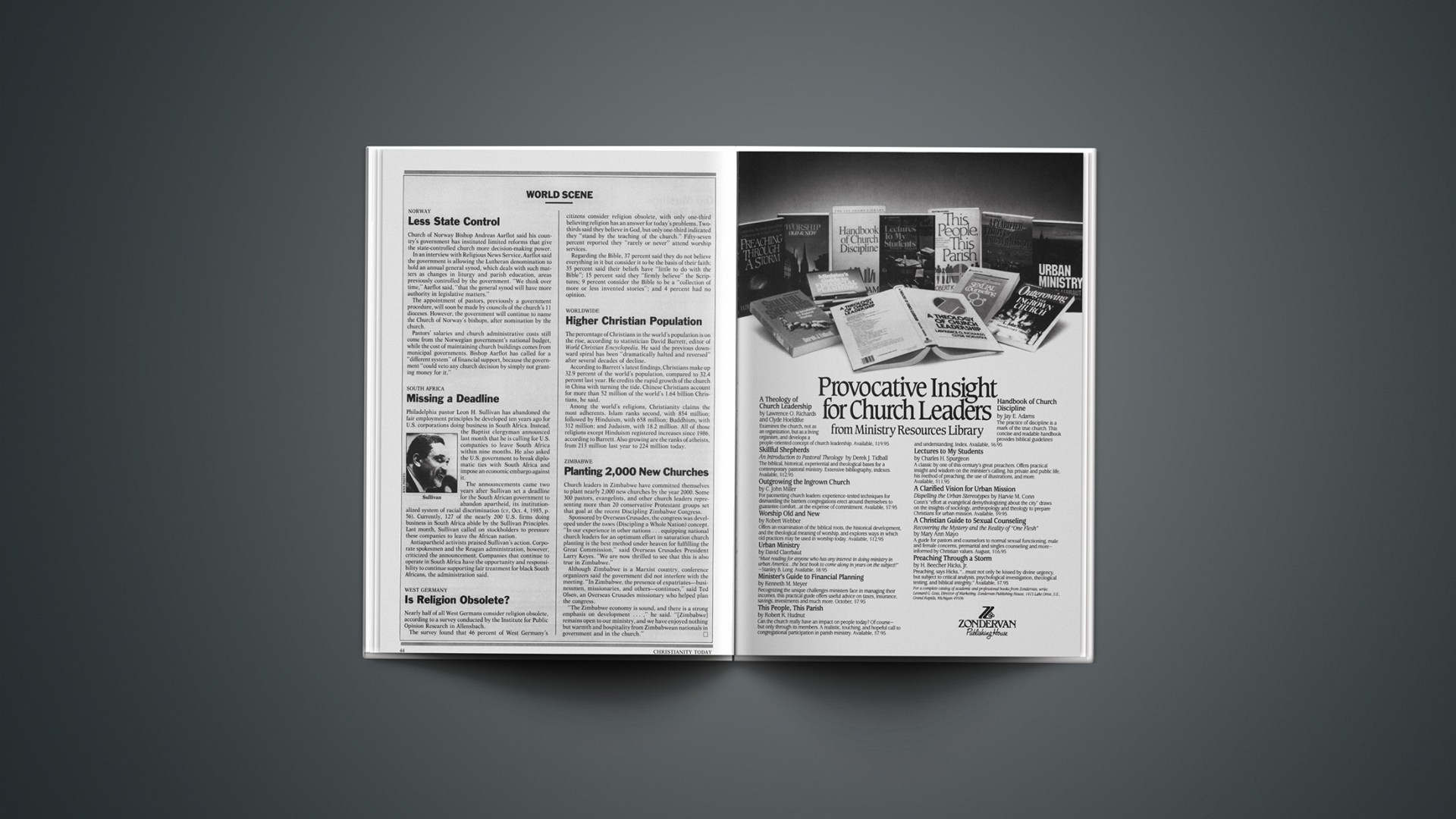NORWAY
Less State Control
Church of Norway Bishop Andreas Aarflot said his country’s government has instituted limited reforms that give the state-controlled church more decision-making power.
In an interview with Religious News Service, Aarflot said the government is allowing the Lutheran denomination to hold an annual general synod, which deals with such matters as changes in liturgy and parish education, areas previously controlled by the government. “We think over time,” Aarflot said, “that the general synod will have more authority in legislative matters.”
The appointment of pastors, previously a government procedure, will soon be made by councils of the church’s 11 dioceses. However, the government will continue to name the Church of Norway’s bishops, after nomination by the church.
Pastors’ salaries and church administrative costs still come from the Norwegian government’s national budget, while the cost of maintaining church buildings comes from municipal governments. Bishop Aarflot has called for a “different system” of financial support, because the government “could veto any church decision by simply not granting money for it.”
SOUTH AFRICA
Missing A Deadline
Philadelphia pastor Leon H. Sullivan has abandoned the fair employment principles he developed ten years ago for U.S. corporations doing business in South Africa. Instead, the Baptist clergyman announced last month that he is calling for U.S. companies to leave South Africa within nine months. He also asked the U.S. government to break diplomatic ties with South Africa and impose an economic embargo against it.
The announcements came two years after Sullivan set a deadline for the South African government to abandon apartheid, its institutionalized system of racial discrimination (CT, Oct. 4, 1985, p. 56). Currently, 127 of the nearly 200 U.S. firms doing business in South Africa abide by the Sullivan Principles. Last month, Sullivan called on stockholders to pressure these companies to leave the African nation.
Antiapartheid activists praised Sullivan’s action. Corporate spokesmen and the Reagan administration, however, criticized the announcement. Companies that continue to operate in South Africa have the opportunity and responsibility to continue supporting fair treatment for black South Africans, the administration said.
WEST GERMANY
Is Religion Obsolete?
Nearly half of all West Germans consider religion obsolete, according to a survey conducted by the Institute for Public Opinion Research in Allensbach.
The survey found that 46 percent of West Germany’s citizens consider religion obsolete, with only one-third believing religion has an answer for today’s problems. Two-thirds said they believe in God, but only one-third indicated they “stand by the teaching of the church.” Fifty-seven percent reported they “rarely or never” attend worship services.
Regarding the Bible, 37 percent said they do not believe everything in it but consider it to be the basis of their faith; 35 percent said their beliefs have “little to do with the Bible”; 15 percent said they “firmly believe” the Scriptures; 9 percent consider the Bible to be a “collection of more or less invented stories”; and 4 percent had no opinion.
WORLDWIDE
Higher Christian Population
The percentage of Christians in the world’s population is on the rise, according to statistician David Barrett, editor of World Christian Encyclopedia. He said the previous downward spiral has been “dramatically halted and reversed” after several decades of decline.
According to Barrett’s latest findings, Christians make up 32.9 percent of the world’s population, compared to 32.4 percent last year. He credits the rapid growth of the church in China with turning the tide. Chinese Christians account for more than 52 million of the world’s 1.64 billion Christians, he said.
Among the world’s religions, Christianity claims the most adherents. Islam ranks second, with 854 million; followed by Hinduism, with 658 million; Buddhism, with 312 million; and Judaism, with 18.2 million. All of those religions except Hinduism registered increases since 1986, according to Barrett. Also growing are the ranks of atheists, from 213 million last year to 224 million today.
ZIMBABWE
Planting 2,000 New Churches
Church leaders in Zimbabwe have committed themselves to plant nearly 2,000 new churches by the year 2000. Some 300 pastors, evangelists, and other church leaders representing more than 20 conservative Protestant groups set that goal at the recent Discipling Zimbabwe Congress.
Sponsored by Overseas Crusades, the congress was developed under the DAWN (Discipling a Whole Nation) concept. “In our experience in other nations … equipping national church leaders for an optimum effort in saturation church planting is the best method under heaven for fulfilling the Great Commission,” said Overseas Crusades President Larry Keyes. “We are now thrilled to see that this is also true in Zimbabwe.”
Although Zimbabwe is a Marxist country, conference organizers said the government did not interfere with the meeting. “In Zimbabwe, the presence of expatriates—businessmen, missionaries, and others—continues,” said Ted Olsen, an Overseas Crusades missionary who helped plan the congress.
“The Zimbabwe economy is sound, and there is a strong emphasis on development …,” he said. “[Zimbabwe] remains open to our ministry, and we have enjoyed nothing but warmth and hospitality from Zimbabwean nationals in government and in the church.”










